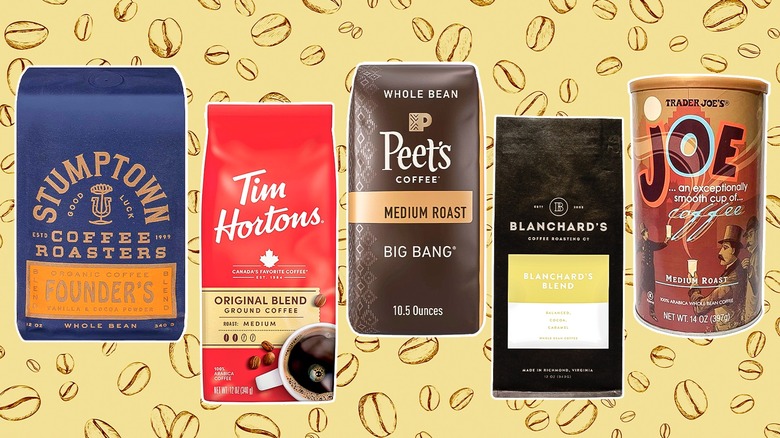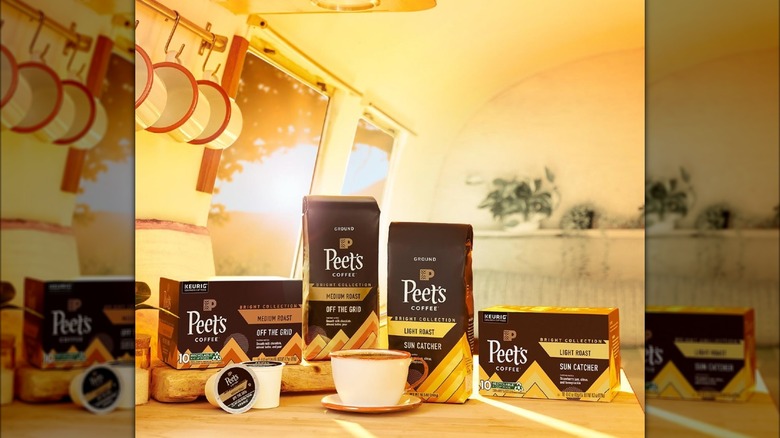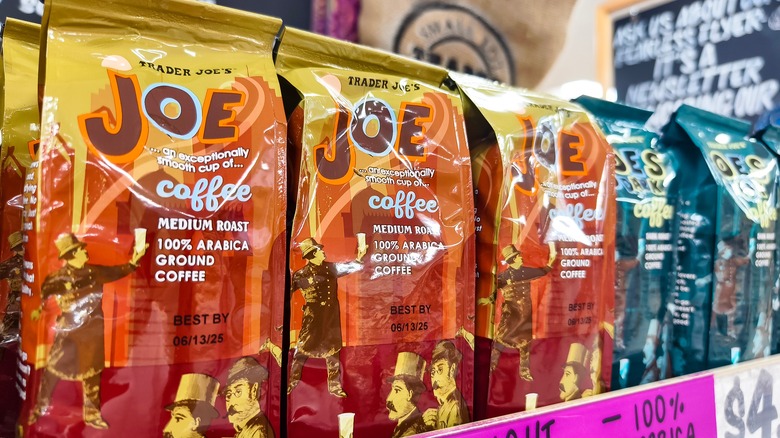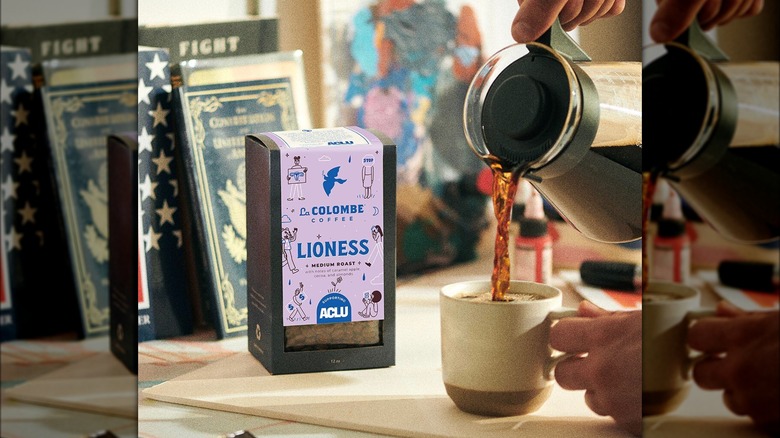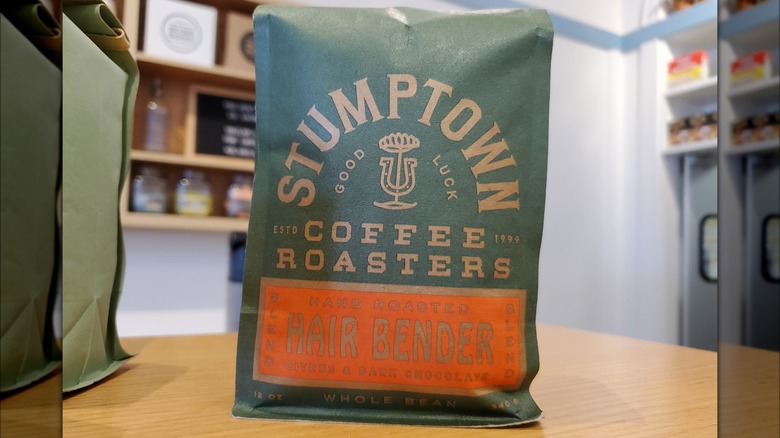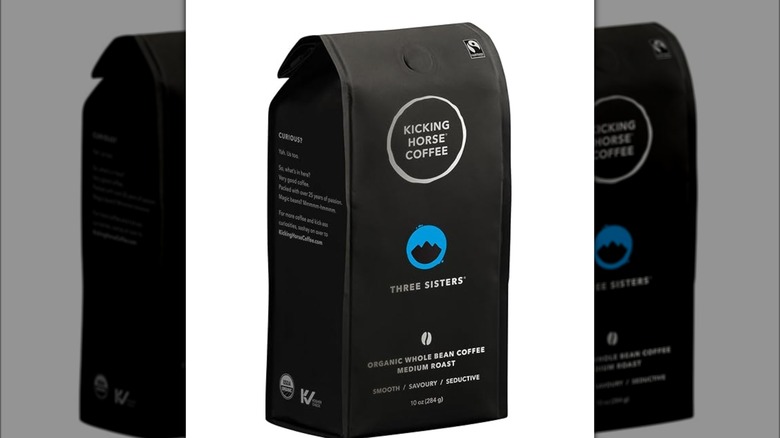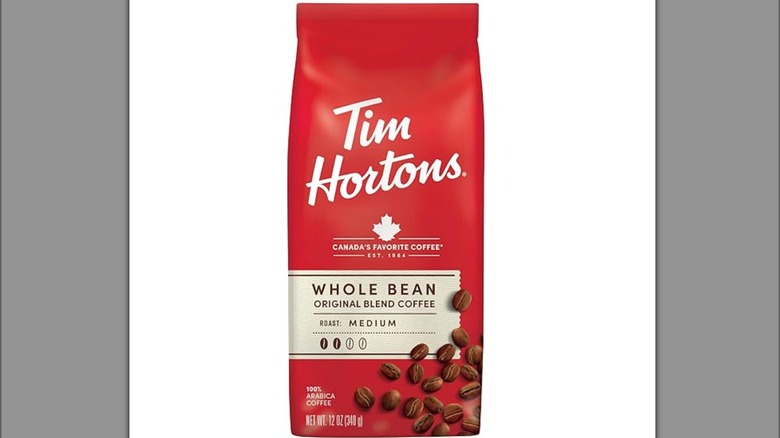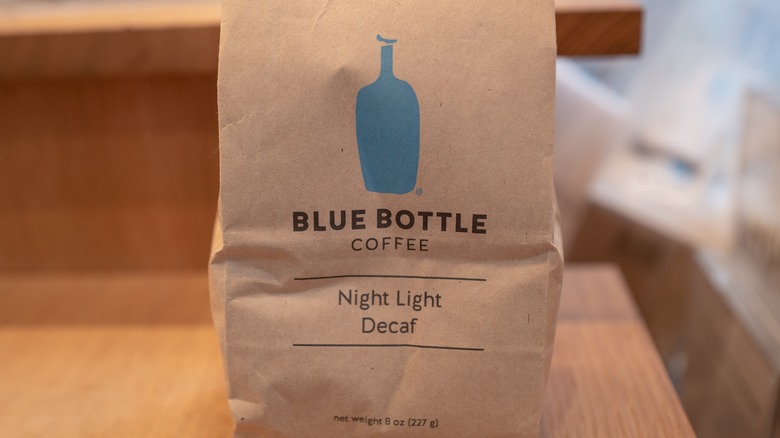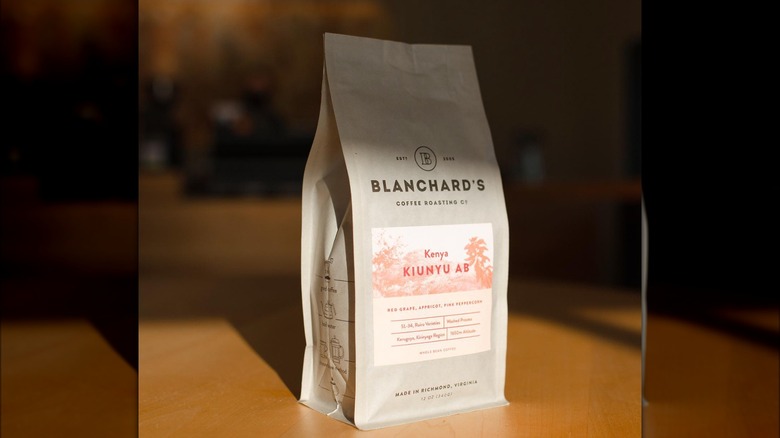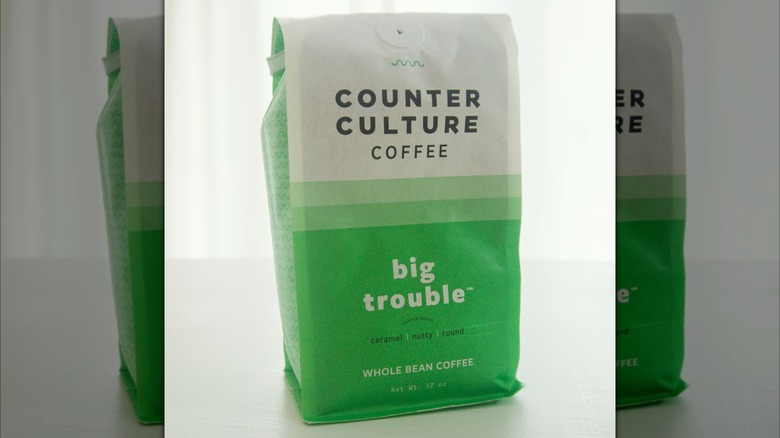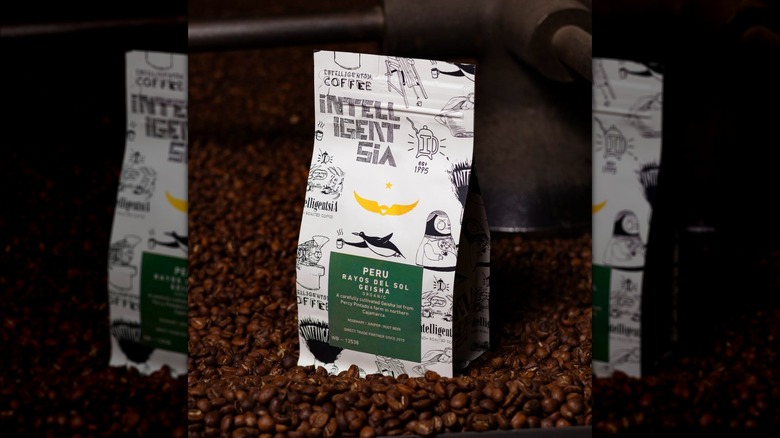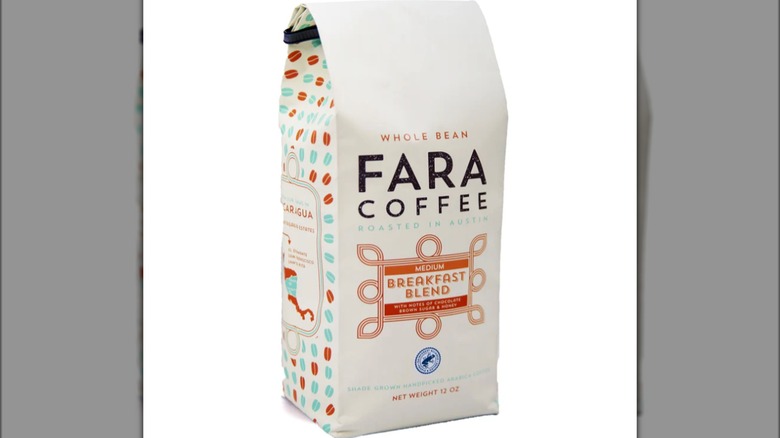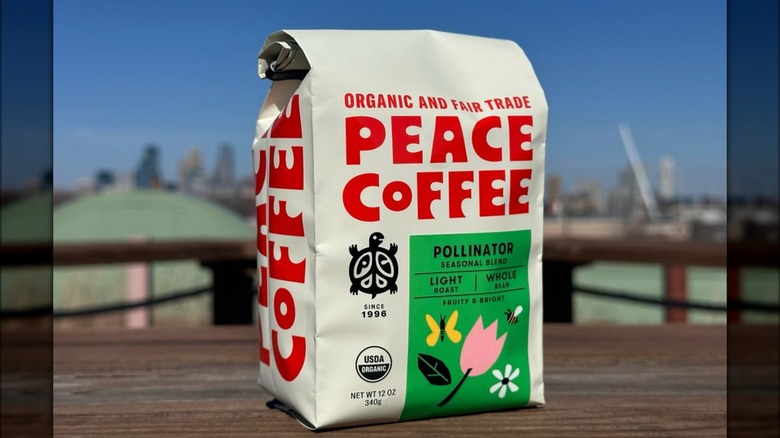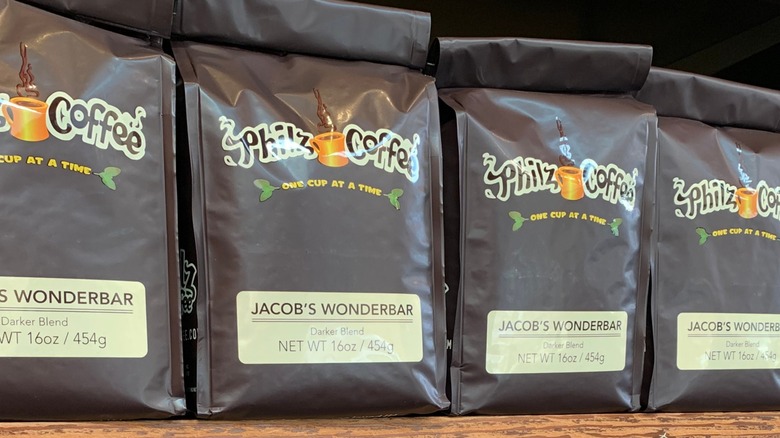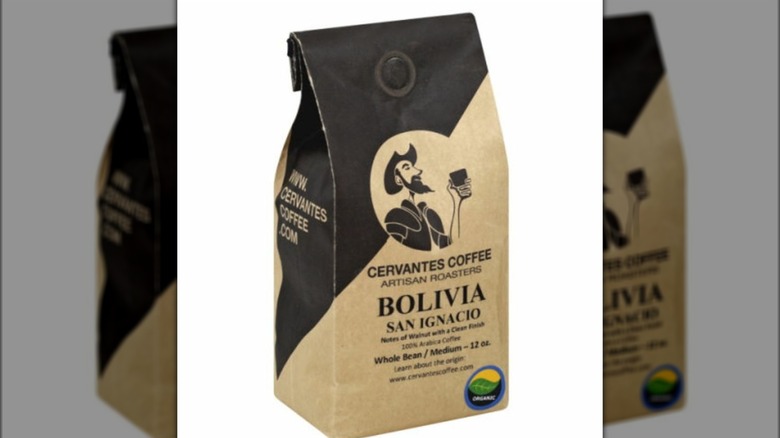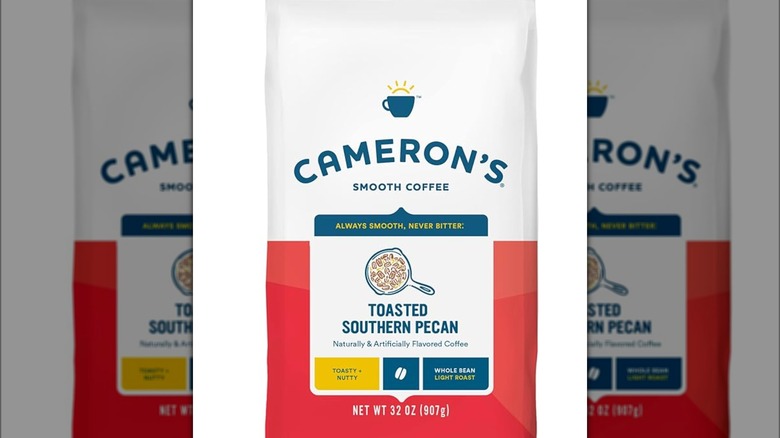15 Store-Bought Coffee Brands With The Highest Quality Beans
We may receive a commission on purchases made from links.
Coffee beans come in many different blends and roasts, but have you ever really considered the actual quality of the beans before buying a bag? Many people who are avid coffee drinkers tend to gravitate towards local coffee shops to buy their high-quality coffee beans. However, there are many great brands that you can find right in your grocery store that also offer high-quality beans, and we're going to let you in on which ones.
Now, what exactly constitutes a high-quality bean? The definition can vary person to person, but for us, it comes down to a few simple things that indicate a great coffee bean. Knowing that the beans come from an area that produces high-quality beans, how and when they are picked, processed, and roasted, the equipment that is used, and how they are stored are all taken into account when looking at the quality of the beans.
Many high-quality brands love to share their processes on their websites or social media. If a brand is transparent, has blogs or videos sharing its process, and clearly states how and where the beans are sourced, that's always a great sign. We researched tons of coffee bean brands to figure out which ones had the highest quality, and hope it'll help you choose which brand to pick up on your next grocery run.
Peet's Coffee
Peet's Coffee has been around since 1966, when the founder, Alfred Peet, opened his first shop, with the vow to only use high-quality beans and a manual roasting system dialed in the brand's specific taste. Those practices are still in place today.
First and foremost, Peet's focuses on responsibly sourced coffee. It is partnered with a non-profit that helps verify all of the farming regions that Peet's sources the beans from. This is done to make sure that pesticides, child labor, or deforestation activities aren't taking place. The company also aids the local farmers around the world by supporting their local communities. By offering options for childcare, fair wages to the farmers, and safe working conditions — the quality of the coffee is then better, too. The farmers have more time and energy to make a quality product, and aren't stressed about churning out impossible standards of high volumes of beans.
Every single bean that is processed through Peet's facility must pass a very strict quality test. There is a specific team, and even a Peet's Coffee Roastmaster, whose responsibility is to taste every single coffee that goes into a Peet's bag. The testers use a method called cupping, which is a very specific method that ensures each coffee is tasted in the exact same way.
Trader Joe's
Many people gravitate towards Trader Joe's because of the great deals, large variety, and good quality food. With a pretty large coffee selection, you're probably wondering if the coffee beans are actually high quality.
According to Trader Joe's website, the company sources its beans from carefully chosen regions, specifically from the "bean belt", an area of the world where the best coffee comes from. Its line of coffees include shade grown beans from family-owned estates in Matagalpa, Nicaragua as well as exclusive blends of bean grown on small lot farms. Once the process of growing, roasting, and taste-test cupping is done, Trader Joe's takes its packaging methods very seriously, ensuring that the quality of roasted beans don't degrade once they're packaged and placed on store shelves.
On the podcast "Inside Trader Joe's," two representatives of the company were interviewed in an episode entitled "The Coffee Cupper's Guide To Trader Joes." They discussed one of TJ's unique methods of packaging its coffee beans for ultimate freshness: using a can. Although TJ's also offers coffee packaged in vacuum-sealed bags as well, getting whole coffee beans packaged in cans guarantees less oxygenation and thus better tasting coffee.
La Colombe Coffee
La Colombe is a trendy coffee company that has 32 cafe locations throughout the United States. From iced latte and cold brew coffee cans that you can pick up in the grocery store, to K cups and coffee bean bags, this company has many products to offer. With so many different things going on, could the quality of the beans actually be that good?
La Colombe offers roasts from all over the world, and focuses on sustainability while doing so. It ensures that the workers in the coffee farms are treated and paid fairly, while equally maintaining certain standards to ensure the quality of the beans. The coffee comes from high elevations of 4,000 to 6,000 feet above sea level — which is where the best coffee is made, according to the La Colombe coffee experts. Its roasting process is very specific and ensures that the beans are processed in a precise way that La Colombe has determined to give the best outcome for the taste of the coffee.
It also focuses on packaging the beans in a way that eliminates oxygen as best as possible. La Colombe uses nitrogen to flush the beans and then packages them immediately. Most of La Colombe's coffee is sold in bags with a one-way valve, which allows the gasses released by the beans to escape while keeping oxygen out at the same time.
Stumptown Coffee Roasters
Stumptown Coffee Roasters began in Portland, Oregon in 1999 and has been going strong ever since. When taking a look at Stumptown Coffee's website, we were immediately impressed with how much information the company shares about its beans.
Stumptown shares that it sources its coffee from the best place possible, which is in the tropics amongst mountainous regions. These coffee farms are located in high elevations, and have the perfect climate for growing high-quality beans. The company has a coffee team that spends half of their year at the actual location of these farms, that way they are directly involved in the production of the coffee beans. The website even has an entire list of every single producer that Stumptown is partnered with to get its coffee beans.
As for roasting, Stumptown takes it very seriously. The website shares, "Roasting is one of the most delicate and critical parts of the chain of events leading to a good cup of coffee ... We're here to bring out the best in the coffee." Through many Youtube videos that the company has shared, you can see a glimpse of the delicate roasting process, showing the care and expertise that the Stumptown's roasters use to make each roast as high-quality as possible.
Kicking Horse Coffee
Kicking Horse Coffee is a Canadian brand that is said to be one of the best-selling organic and fair trade coffee companies in Canada. The company only uses Arabica beans, which are considered to be high-quality beans due to a smooth, pleasant taste and low to medium acidity. Kicking Horse also only partners with farmers who avoid pesticides, herbicides, and use sustainable practices.
In a Youtube video that shares a behind the scenes look at Kicking Horse Coffee's roasting methods, we learned that the company is constantly adapting its methods and machinery to create the best possible outcome. Currently, it uses a rotary batch mixer, which aids in mixing and roasting the beans gently, avoiding the damage that can occur with other large machines. Each roast is tasted for quality assurance before it gets sold.
Tim Hortons
Most Canadians swear by their Tim Hortons, which has been brewing its famously delicious coffee since 1964. Today, a variety of Tim Hortons coffee bean bags can be found in most grocery store's coffee aisles. The company is very confident in its quality of beans: It uses small coffee farmers throughout the world, and has multiple sources to ensure freshness of coffee year round, keeping in mind the seasonality of the coffee beans in each region.
The company also focuses on its economical, social, and environmental impact when sourcing and producing its coffee beans. By working with local coffee farmers directly, and setting clear objectives, Tim Hortons has more control over the quality of its product. It hires a third party to then continue to verify these objectives that were set with each farm, so that the production can continue right on track. Ultimately, the company and the customers can trust that the coffee beans are made ethically and sustainably. Tim Hortons also has a team of Master Blenders who hand select certain coffee beans and blend them together, creating the delicious coffee that we know today.
Blue Bottle
With tons of locations in major cities in the US and Asia, Blue Bottle must be doing something right. Blue Bottle takes great pride in its coffee, and specifically focuses on the freshness of the beans. In a blog on its site, the company shares its methods to ensure that only the freshest beans are sold. The company doesn't allow its beans to sit in warehouses for months before they're brought to stores — instead, it keeps a close eye on when the coffee beans were picked, sorted, rested, and shipped.
Coffee that is produced well tends to last longer, so the company ensures that the high-quality standard starts from the very beginning. When it comes to roasting, it only roasts in small made-to-order batches, which also helps keep the level of freshness. Blue Bottle even has a Quality Control Team who are constantly taste-testing every single coffee offered by the company. It's very clear on the website that Blue Bottle takes the freshness and quality of its beans very seriously.
Blanchard's Coffee
Blanchard's Coffee may be a little lesser known to some of our readers than the previous brands mentioned. This brand began in Richmond, Virginia and was originally a coffee shop. After the success of the cafe, the company began selling its coffee beans nationally. Now, you can pick up Blanchard's at most grocery stores.
Blanchard's has a very strong philosophy about its quality of coffee beans. It believes that the key to great roasting of a coffee bean starts with great sourcing. Blanchard's sources its beans ethically by paying its suppliers fairly and creating relationships with those suppliers, which in turn creates higher-quality beans. The website states, "It is easy for roasters to glamorize this process and use it purely as a marketing tool, but we strive to build something deeper; meaningful relationships built on handshakes and face to face interaction."
Blanchard's offers single origin roasts as well as blends, and many of the bags share exactly where the beans were sourced from. Blanchard's isn't the only company to do this, but it does create more of an impact knowing that the company makes such an effort to create a relationship with the farms that it sources its beans from.
Counter Culture Coffee
Counter Culture Coffee has very bright, trendy packaging that may draw many people's eyes when searching through the coffee aisle in the grocery store. The company shares that its beans are "traceable from seed to cup", which speaks directly to the quality of its product. Counter Culture uses two effective ways to produce its beans: washing and natural drying. Both processes give a different taste profile to the bean, and the company shares which process it used on each bag. It's great to see that Counter Culture is involved in every step of the coffee bean production process.
One interesting thing about Counter Culture is that it was the very first coffee company to use a new kind of technology for sorting the roasted coffee beans. It's called optical sorting technology, and the purpose of it is to guarantee consistently high-quality coffee beans. The sorter can detect when a bean isn't up to a specific standard, and will discard it from the rest of the group — almost like the machines in Willy Wonka.
Intelligentsia Coffee
Intelligentsia Coffee is a Chicago-based brand that has been around since 1995. The original goal of the company was to bring fresh, great tasting coffee to the Chicago area. From the very beginning, Intelligentsia put energy into making sure that it was getting its beans from the best sources in the world.
On the blog on its website, it shares a special post for every single-origin coffee that they offer. In these posts, you can learn about exactly where the beans were picked, the method that was used in growing them, and other interesting information about the coffee beans. It shows just how much Intelligentsia cares about the quality of the beans. To Intelligentsia, high quality beans have a balance of sweetness, acidity, and clarity.
All of the coffee from Intelligentsia is roasted onsite right in Chicago, where it all started. It is very intentional about every step of the process, and believes that every cup of coffee is roasted with intention. Through a very specific and deliberate method, Intelligentsia knows exactly how to produce the highest quality beans.
Fara Coffee
Fara Coffee grows its coffee beans in family-owned farms in Nicaragua. The founder, Maria Farahani, even comes from a family of coffee farmers herself. The beans are shade-grown, which helps preserve the environment, and then each bean is hand picked. Hand picked beans tend to omit the chance of any low-quality beans making their way into the mix. The beans are then exported to Austin, Texas where each batch is carefully roasted. The Fara Coffee team then tastes each batch, checking for any defects or inconsistencies.
This brand is considered to be gourmet coffee, and aims to provide the customers with an amazing product while also aiding the communities in Nicaragua that help grow the beans. Overall, it provides extremely high-quality coffee while also holding itself to high standards for the environment as well as society.
Peace Coffee
Peace Coffee began as a non-profit organization called the Institute for Agricultural and Trade Policy. This organization, which started in the '80s, had a mission to help the families of farmers during the family farm crisis. From there, the organization went on to help farming families all over the world — which included coffee bean farmers.
After some partnerships with coffee bean farmers throughout the world, Peace Coffee was born. To this day, Peace strives to create a high-quality product while supporting its farming network through fair trade, investments in high-quality products, and awareness of its environmental impact as well. Each coffee bean is carefully picked by hand, and then are sent to be roasted in Minneapolis in a warehouse that uses solar energy and repurposed building materials. Through the roasting process, a Quality Team taste-tests the beans to ensure that a consistently fresh and tasty product is made.
Philz Coffee
Philz Coffee is a West Coast staple that has been making its delicious and unique coffee since 1978, specializing in customized coffee blends. One of the main things that Philz Coffee focuses on is its sustainability practices. It only works with coffee bean suppliers who follow high standards of sustainable farming practices and fair labor. These standards trickle down to the standards of the coffee beans as well. Happier, well-paid farmers have better resources and time to produce coffee beans that are higher quality.
Before any of Philz Coffee gets shipped out, the company taste tests every single coffee lot through the entire process — before roasting, after roasting, and many other times in between. Philz Coffee wants to ensure consistency amongst each blend, making sure that they taste exactly how they were intended to. The taste-testers are highly skilled to look out for changes in color, sounds while roasting, and of course, taste. They have to be fully involved in each process that the beans go through.
Cervantes Coffee
Cervantes Coffee is a woman-owned small coffee business. The company is particularly passionate about single origin coffee, believing that customers should know exactly where the coffee beans come from. In creating the single origin coffee, Cervantes ensures that the beans are produced through fair trade and are made in a way that is safe for the environment. It also only purchases small batches of Arabica coffee, specifically from high altitudes, ensuring high quality.
Cervantes Coffee visits the farms that it partners with multiple times a year, creating strong and trusting relationships. By assisting the farmers as well as only buying in small batches, this allows the farmers to continue to use proper practices without having the pressure to produce large quantities. Ultimately, high quality beans are the outcome — and it works out great for both the farmers and Cervantes.
Cameron's Smooth Coffee
Cameron's Smooth Coffee is a company that was founded in Wisconsin in 1980. There were never any other coffee shop locations that opened, however you can find Cameron's Smooth Coffee beans in most grocery stores.
The team for Cameron's Smooth Coffee travels the world to find the greatest-quality 100% Arabica beans. It sources its beans from many different countries, many of which are from small family farms. Cameron's makes it a point to get to know the people that they are partnering with to create the coffee. The farms sun dry the coffee beans, which results in fuller and more flavorful coffee. Once the beans arrive at the roasting facility, it uses European-style roasters and only roasts in small batches. You can even tour the roasting facility to see how it's all done, if you ever desired!
Overall, Cameron's Smooth Coffee aims to create a positive impact – whether that be through sourcing its coffee responsibly, reducing waste, or creating a high-quality cup of coffee.
Methodology
When finding coffee brands for this piece, we went through many popular grocery store's coffee aisles. We took notes of the brands that were being sold, and dove into some research to find out more about each company. We mainly considered each brand's sourcing and roasting methods. From there, we also considered sustainability practices and other initiatives that showed the company's commitment to creating a quality product while also making a positive impact.
